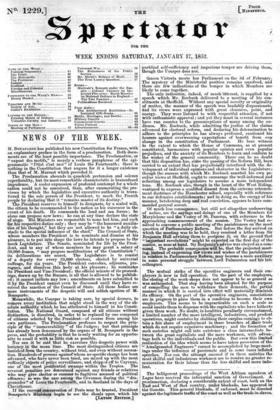Queen Victoria meets her Parliament on the 3d of February..
The mystery of the Ministerial position remains unsolved, and there are few indications of the temper in which Members are- likely to come together.
The only indication, indeed, of much interest, is supplied by a speech which Mr. Roebuck delivered to a meeting of his con- stituents at Sheffield. Without any special novelty or originality of matter, the manner of the speech was laudably dispassionate, find its views were expressed with great clearness, point, and energy. They were listened to with respectful attention, if not with enthusiastic approval ; and yet they must in several instances have run counter to the preconceptions of many amcing the au- dience. Mr. Roebuck, while admitting the justice of the claims advanced for electoral reform and declaring his determination to adhere to the principles he reform, always professed, cautioned his hearers against overweening expectations of benefit from any change in the constitution of Parliament. He bore witness to the extent to which the House of Commons, as at present constituted, harmonizes with popular opinion and even popular prejudices, and the anxiety of its Members to learn and conform to the wishes of the general community,. There can be no doubt that this disposition has, shift the passing of the Reform Bill, been carried to an extent that has prejudicially interfered with the de- velopment of individual opinions and character in the Legislature; though the success with which Mr. Roebuck asserted his own pe- culiar views at Sheffield, ought to encourage the well-informed and reflecting among our legislators to assume a more independent tone. Mr. Roebuck also, though in the heart of the West Riding, ventnred to express a qualified dissent from the extreme retrench- ment doctrines of the Manchester sohool, especially, with reference to our defensive establishments; and in doing so, the energy of his manner' betokening deep and real conviction, appears to have oom- mended general assent. Of much less consequence, but still not altogether undeserving of notice are the sayings and doings of one of the Members for Xarylebone and the Vestry of St. Pancras, with reference to the approaching commencement of the session. The Vestry had re- solved to convene a public meeting of the parishioners on the moot question of Parliamentary Reform. But before the day arrived on which the meeting was to be held, they received a letter from Sir Benjamin Pall advising them to postpone it, on the ground that "important revelations" might be expected on the first day of the session, so near at hand. Sir Benjamin's advice was obeyed as a com- mand. The probable consequence will be, that the projected meet- ing, instead of expressing the views and wishes of the parishioners in relation to Parliamentary Reform, may become a mere auxiliary in some personal struggle between Lord Palmerston and his late colleagues.


























